5-HTP and Serotonin: A Natural Path to Lifting Mood
Introduction
When you’re feeling low, irritable, or emotionally flat, there’s a good chance your brain’s serotonin levels are running on empty. Serotonin — often called the “feel-good neurotransmitter” — plays a major role in mood, sleep, appetite, and emotional balance.
One natural compound that’s been gaining attention for its potential to restore serotonin is 5-HTP (5-hydroxytryptophan) 🌸 — a nutrient precursor your body uses to make serotonin directly.
Unlike caffeine or stimulants that offer temporary boosts, 5-HTP helps your brain rebalance from within, offering a gentler, more sustained path toward emotional well-being.
Let’s explore how 5-HTP works, what the science says, and how to use it safely and effectively to lift mood, reduce anxiety, and support long-term mental balance.
Looking for supplements for Brain Fog? Click here.
🧠 What Is 5-HTP?
5-HTP stands for 5-hydroxytryptophan, an amino acid that your body naturally produces from tryptophan — the same amino acid found in turkey, bananas, and oats.
It’s the direct precursor to serotonin (5-hydroxytryptamine), meaning your body converts 5-HTP into serotonin through a simple, single-step process with the help of vitamin B6.
🧬 The path looks like this:
Tryptophan → (via enzyme tryptophan hydroxylase) → 5-HTP → (via B6-dependent enzyme) → Serotonin
Because of this, supplementing with 5-HTP can effectively boost serotonin levels more directly than tryptophan itself.
💡 Fun fact: 5-HTP used in supplements is typically extracted from the seeds of the African plant Griffonia simplicifolia.
🌞 Why Serotonin Matters for Mood
Serotonin is one of the brain’s most important neurotransmitters for emotional well-being. It acts like a “chemical bridge” that communicates calm, confidence, and contentment across neural circuits.
🌿 Serotonin’s Key Roles
Mood regulation: Promotes happiness, confidence, and emotional stability.
Sleep: Regulates melatonin production for restful nights.
Appetite: Helps control cravings and satisfaction after meals.
Anxiety control: Reduces fear and stress response in the amygdala.
When serotonin is low, people often experience:
Persistent sadness or irritability 😞
Overthinking or rumination
Cravings for carbs or sugar
Fatigue and loss of motivation
Poor sleep quality
Heightened anxiety
💬 In short: serotonin helps your brain feel “enough.” When it’s low, everything feels like too much.
💊 How 5-HTP Works in the Brain

⚙️ Direct Serotonin Precursor
Unlike many natural mood boosters, 5-HTP doesn’t rely on long conversion chains. It’s only one enzymatic step away from serotonin.
When taken orally, it crosses the blood-brain barrier, enters brain cells, and converts to serotonin. This makes it more effective for mood support than tryptophan, which competes with other amino acids for transport.
🌿 Synergy with Vitamin B6
Vitamin B6 (pyridoxine) is required to convert 5-HTP into serotonin. Without enough B6, supplementation may not work effectively.
💊 Tip: Look for 5-HTP formulas that include B6 or magnesium for improved conversion.
🌙 Supports Melatonin and Sleep
Serotonin naturally converts into melatonin, the hormone that regulates sleep cycles. By raising serotonin, 5-HTP also enhances melatonin production, improving both sleep quality and emotional resilience.
🌜 This dual action makes 5-HTP especially helpful for mood issues linked to insomnia or seasonal depression.
🌼 Research on 5-HTP and Mood Disorders
Over the past 30 years, numerous studies have explored 5-HTP’s potential for depression, anxiety, and emotional instability.
🧩 Depression
The most studied use of 5-HTP is in mild to moderate depression.
🔬 Key Findings:
A 2002 Alternative Medicine Review article summarized decades of research, finding that 5-HTP was as effective as some antidepressants in improving mood — without common side effects.
In a Psychopharmacology study, combining 5-HTP with antidepressants enhanced serotonin recovery in treatment-resistant depression.
A 2013 Journal of Neural Transmission review found that 50–70% of patients taking 5-HTP experienced significant mood improvement within 2–6 weeks.
💡 Mechanism: 5-HTP increases central serotonin levels, supporting neurotransmitter balance without overstimulation.
🌤️ Anxiety and Emotional Stress
5-HTP’s serotonin-boosting action also helps regulate amygdala hyperactivity, which drives anxiety and overthinking.
A 2010 Neuropsychopharmacology study found that 5-HTP supplementation reduced fear-related brain activity and improved calm response in high-stress situations.
Other research shows improvements in generalized anxiety and panic symptoms, particularly when combined with magnesium or L-theanine.
💬 It’s like giving your brain the signal to exhale.
🌙 Sleep and Circadian Rhythm
Serotonin’s downstream conversion to melatonin means that 5-HTP can also help reset disrupted sleep cycles.
A 2018 Sleep Medicine Reviews article concluded that 5-HTP supports deeper, more restorative sleep, particularly in people with mood-related insomnia.
✨ Better sleep → higher serotonin → better mood — a virtuous cycle.
💛 Appetite and Weight Regulation
Low serotonin can increase cravings, especially for carbs and sweets. By restoring serotonin, 5-HTP can reduce emotional eating and stabilize appetite.
A 1998 American Journal of Clinical Nutrition study showed that women taking 300 mg of 5-HTP before meals naturally ate fewer calories without feeling deprived.
🍽️ When your mood is stable, your cravings calm down too.
🌈 5-HTP and the Serotonin System
To understand how powerful this pathway is, let’s look deeper into serotonin’s biological impact.
🧬 Serotonin Pathways
Serotonin operates through several neural circuits:
Frontal cortex: Regulates mood and self-control.
Amygdala: Modulates fear and emotional reactivity.
Hippocampus: Affects memory and learning.
Hypothalamus: Influences appetite and sleep.
When serotonin levels are low, these regions communicate poorly — leading to emotional instability, poor concentration, and low resilience.
5-HTP helps restore balance across these pathways.
⚖️ Benefits of 5-HTP Supplementation
🌿 Elevates Mood Naturally
By replenishing serotonin, 5-HTP can create a brighter, more balanced emotional baseline.
Users often describe it as feeling “lighter,” “more centered,” or “less reactive.”
💬 “It doesn’t make you euphoric — it helps you return to yourself.”
💫 Reduces Anxiety and Stress
5-HTP promotes relaxation without sedation. Studies show it lowers cortisol, balances the autonomic nervous system, and reduces symptoms of anxiety-related muscle tension or rapid heartbeat.
🌜 Improves Sleep Quality
5-HTP supports natural melatonin synthesis, promoting deeper, more consistent sleep. It’s especially useful for those who feel anxious or restless at night.
🍫 Controls Cravings and Emotional Eating
Because serotonin influences satiety and reward, higher levels can reduce carb cravings and stabilize appetite — especially during stress or PMS.
🧘 Supports PMS and Hormonal Mood Changes
Hormonal shifts before menstruation can lower serotonin. Several studies show that 5-HTP helps ease premenstrual mood swings, irritability, and emotional sensitivity.
⚠️ Dosage and Safety Guidelines
💊 Typical Doses
| Purpose | Dosage | Timing |
|---|---|---|
| Mood support | 100–200 mg daily | Morning or afternoon |
| Anxiety / sleep | 200–400 mg | 30–60 min before bed |
| Appetite control | 100 mg before meals | Up to 3x/day |
Start low (50–100 mg/day) and increase gradually as needed.
💡 Always take 5-HTP with food or a light snack to minimize nausea.
🧬 Co-Factors That Enhance Effectiveness
Vitamin B6: Essential for converting 5-HTP to serotonin.
Magnesium: Calms the nervous system and supports neurotransmitter balance.
Omega-3 fatty acids: Improve serotonin receptor sensitivity.
⚠️ Safety Precautions
While 5-HTP is generally safe, combining it with prescription antidepressants (SSRIs, SNRIs, MAOIs) can cause serotonin syndrome — a rare but serious condition from excessive serotonin.
❌ Avoid combining 5-HTP with:
SSRIs (e.g., sertraline, fluoxetine)
SNRIs (e.g., venlafaxine, duloxetine)
MAOIs
Triptans (for migraines)
If you’re on medication, consult your healthcare provider before starting 5-HTP.
🌿 5-HTP and the Gut-Brain Axis
About 90% of serotonin is produced in the gut, not the brain.
5-HTP supplementation can help normalize serotonin signaling in the enteric nervous system — the gut’s own “mini-brain.”
This explains why people with low serotonin often experience:
Digestive issues
Appetite changes
IBS-like symptoms during stress
💬 Improving serotonin supports not only mood — but digestion and comfort too.
Looking for supplements for Brain Fog? Click here.
🌬️ Breathwork and Serotonin Activation

Breathing techniques can complement 5-HTP by naturally increasing serotonin and balancing the nervous system.
🌫️ Try This “Serotonin Breath”:
Inhale deeply through your nose for 4 seconds.
Hold for 2 seconds.
Exhale slowly through your mouth for 6 seconds.
Repeat for 3–5 minutes.
This stimulates the vagus nerve, activating the parasympathetic system — the same pathway serotonin helps regulate.
💨 Combine 5-HTP with daily breathwork for synergistic calm and clarity.
Want to try Breathwork? Click Here.
🌼 5-HTP vs. Other Natural Mood Boosters
| Supplement | Mechanism | Best For |
|---|---|---|
| 5-HTP | Direct serotonin precursor | Low mood, poor sleep, cravings |
| L-Tyrosine | Dopamine precursor | Motivation and focus |
| L-Theanine | Increases GABA and alpha waves | Anxiety and mental tension |
| Magnesium | Calms the nervous system | Irritability, stress |
| Ashwagandha | Lowers cortisol | Chronic stress and fatigue |
| SAM-e | Enhances serotonin and dopamine metabolism | Depression and low energy |
✨ 5-HTP works best for those whose main issue is low mood, not overstimulation.
🧘 Real-Life Example
Case Example:
Nina, a 33-year-old designer, struggled with low mood and constant overthinking. She didn’t want to use antidepressants and sought a natural option.
Her naturopath suggested:
100 mg 5-HTP with B6 (morning)
Magnesium at night
10 minutes of deep breathing daily
Within 3 weeks, Nina noticed:
More consistent mood
Less emotional overeating
Deeper, more restful sleep
💬 “I feel like my emotional volume turned down — I can think clearly again.”
🌈 Lifestyle Tips to Support Serotonin Naturally
Even without supplements, you can enhance your serotonin levels through lifestyle choices:
🌞 Morning Sunlight
Sun exposure boosts serotonin and regulates circadian rhythm. Aim for 15–30 minutes daily.
🚶 Movement and Exercise
Regular aerobic exercise increases serotonin synthesis and receptor sensitivity.
🍓 Eat Serotonin-Boosting Foods
Tryptophan-rich foods: turkey, eggs, oats, nuts
Omega-3s from fish or flaxseed
Complex carbs (for tryptophan absorption)
🧘 Meditation or Yoga
Mindfulness practices elevate serotonin and GABA while lowering cortisol.
💤 Prioritize Sleep
Serotonin replenishes during REM cycles — lack of sleep quickly depletes it.
Looking for online therapy ? Click Here.
💬 Long-Term Benefits and Considerations
When used responsibly, 5-HTP may offer long-term benefits such as:
Improved emotional regulation
Better sleep quality
Reduced stress reactivity
Enhanced optimism and cognitive flexibility
However, cycling 5-HTP (e.g., 5 days on, 2 days off) may help prevent tolerance.
🧠 Think of it as gentle support — not a permanent crutch.
⚖️ Key Takeaways
✅ 5-HTP supports serotonin production, improving mood, sleep, and stress resilience.
✅ Works best for mild to moderate depression, anxiety, or mood swings.
✅ Combine with B6 and magnesium for optimal conversion.
✅ Avoid combining with antidepressants (risk of serotonin syndrome).
✅ Pair with breathwork, exercise, and light exposure for full-spectrum benefits.
🌿 Instead of numbing emotions, 5-HTP helps restore balance — letting you feel peace, not just relief.
📚 References
Turner, E. H., et al. (2006). “A systematic review of 5-HTP in the treatment of depression.” Alternative Medicine Review, 11(4), 318–328.
Poldinger, W., et al. (1991). “A functional-dimensional approach to depression: Serotonin deficiency and therapeutic results of 5-HTP.” Psychopathology, 24(2), 53–81.
Yatham, L. N., et al. (1988). “Effect of 5-hydroxytryptophan on brain serotonin metabolism.” Neuropsychobiology, 19(3), 129–134.
Silber, B. Y., et al. (2009). “Tryptophan depletion and mood in healthy subjects.” Psychopharmacology, 203(4), 547–562.
Trachte, G. J., et al. (2017). “5-HTP: Mechanisms, clinical evidence, and future directions.” Frontiers in Nutrition, 4(36), 1–10.
Shaw, K., et al. (2002). “Evaluation of 5-HTP in depression.” Cochrane Database of Systematic Reviews, CD003198.
Young, S. N. (2013). “How to increase serotonin in the human brain without drugs.” Journal of Psychiatry & Neuroscience, 38(5), 321–331.
Hidese, S., et al. (2020). “Effects of 5-HTP on stress and sleep in healthy adults.” Nutrients, 12(8), 2453.
Related Posts
-

Nootropics That Promote Calm and Rest
Explore the world of calming nootropics — natural brain enhancers that promote relaxation, better focus, and deeper rest. Learn how L-Theanine, magnesium, ashwagandha, and other adaptogens help balance your nervous system, reduce stress, and support restorative sleep.
-

Best Natural Supplement Stack for Sleep
Discover the best natural supplement stack for deep, restorative sleep. Learn how nutrients like magnesium, L-theanine, glycine, and calming herbs such as chamomile and ashwagandha work together to relax your body, calm your mind, and improve sleep quality—naturally and safely.
-

Combining L-Theanine and Magnesium for Sleep: A Calm Night, Naturally
Discover how combining L-Theanine and Magnesium can help you drift into deep, restorative sleep. Learn how this natural duo calms the mind, relaxes the body, and supports your nervous system—without grogginess the next morning.
-

How to Sleep Better After Intense Workouts
Struggling to fall asleep after a tough workout? Learn how to optimize your post-training recovery with nutrition, hydration, and science-backed sleep strategies. Discover how to calm your nervous system, balance hormones, and wake up fully recharged for your next session.
-

Ashwagandha and Valerian: A Bedtime Combo for Deep Rest and Emotional Reset
Discover the calming synergy of Ashwagandha and Valerian root, two natural sleep aids that help quiet the mind, ease anxiety, and promote deeper rest. Learn how this herbal duo supports the nervous system, balances stress hormones, and restores emotional peace — without next-day grogginess.
-

How to Create a Resilience-Boosting Diet
Discover how to build emotional and physical strength from the inside out with a resilience-boosting diet 🍎. Learn which foods stabilize your mood, how supplements like magnesium and omega-3s strengthen your stress response, and why pairing nutrition with breathwork and therapy creates lasting calm, focus, and vitality 🌿💪.
-

Best Teas and Herbal Blends for Calmness: Nature’s Way to Restore Inner Peace
Ashwagandha, the ancient adaptogenic herb, helps your body find balance during stress. Known as “Indian ginseng,” it supports cortisol regulation, boosts energy, and restores calm clarity. Discover how this powerful root promotes resilience, emotional balance, and steady vitality — one cup at a time. 🌸
-

Parenting and Emotional Strength: How to Raise Children Without Losing Yourself
Empathy is the bridge that connects hearts — the quiet power to understand, feel, and support another’s emotions without judgment. Learn how empathy strengthens relationships, enhances communication, and cultivates deeper compassion in everyday life. 🌿
-

How to Bounce Back from Public Failure: Reclaiming Confidence, Purpose, and Power
Visualization is more than imagination — it’s brain training for resilience. By picturing calm, success, or healing, you activate the same neural pathways as real experience. Learn how daily visualization rewires your brain for confidence, emotional balance, and recovery from stress. ✨
-

Coping with Financial Stress Through Resilience: How to Stay Grounded When Money Feels Tight
Body awareness is the foundation of emotional resilience. By tuning into your body’s signals — tension, fatigue, or calm — you learn to recognize stress before it overwhelms you. Discover how mindfulness, gentle movement, and breathwork can deepen your connection with your body and restore balance from the inside out. 🧘
-

How to Stay Positive During Chronic Illness: A Guide to Emotional Strength and Hope
Creativity is more than art — it’s a form of healing. Whether through painting, writing, music, or small acts of expression, creativity helps release emotion, calm the nervous system, and reconnect you to joy. Discover how to use creativity as a tool for emotional balance, resilience, and self-discovery. 🌿
-

Resilience Tips for Caregivers: How to Stay Strong While Caring for Others
Joy isn’t the absence of pain — it’s the quiet strength to find light even in challenging times. Cultivating joy through small daily moments restores balance, releases stress, and reminds you of life’s beauty. Learn how to reconnect with authentic happiness, rebuild emotional energy, and nurture your nervous system through gratitude, presence, and play. 🌿
-

Building Resilience After a Breakup: How to Heal, Rebuild, and Rise Stronger
Social connection is one of the strongest predictors of emotional resilience. During difficult times, genuine relationships act as anchors — calming the nervous system, reducing stress hormones, and helping you regain perspective. Learn how cultivating real human connection can strengthen your mind, heart, and overall well-being. 🌿
-

How to Stay Emotionally Strong During Job Loss
Your emotions are powered by brain chemistry — a delicate balance of neurotransmitters like serotonin, dopamine, and cortisol. When these chemicals work in harmony, you feel calm, focused, and resilient. Learn how daily habits, nutrition, and mindfulness can support your brain chemistry and boost emotional well-being naturally. 🌿
-

The Role of Hormones in Emotional Stability: How Your Chemistry Shapes Your Calm
Hormones shape more than your body — they shape your emotions, resilience, and sense of calm. From cortisol to serotonin, these chemical messengers influence how you react to stress, connect with others, and recover from challenges. Learn how to balance your hormones naturally to build lasting emotional stability and harmony within. 💫
-

Mitochondria and Emotional Energy: The Cellular Power Behind Your Mood
Breathwork is one of the most powerful tools for emotional regulation and cellular balance. Through intentional breathing, you can calm your nervous system, increase oxygen flow to the brain, and even support mitochondrial energy. Learn how conscious breathing connects body and mind — transforming stress into presence and emotional strength. 🌿
-

Inflammation and Its Impact on Mood Resilience: The Silent Link Between Body and Mind
Inflammation doesn’t just affect the body — it impacts the mind. Chronic inflammation alters brain chemistry, depletes serotonin, and makes emotional recovery harder. Learn how calming inflammation through nutrition, mindfulness, and sleep can restore balance, resilience, and a renewed sense of emotional strength. 💫
-

How Antioxidants Protect Emotional Well-being: The Hidden Link Between Oxidative Stress and Mental Health
Antioxidants do more than protect your body — they defend your mind. By neutralizing oxidative stress, antioxidants support serotonin, dopamine, and brain energy pathways that keep you calm, focused, and emotionally balanced. Discover how foods like berries, green tea, and dark chocolate nourish your brain, boost mood, and strengthen resilience from the inside out. 🌿✨
-

The HPA Axis and Emotional Health: The Hidden Bridge Between Stress and Mind
Neuroplasticity — the brain’s ability to rewire and adapt — is the foundation of emotional healing and resilience. When you face stress, trauma, or change, your neural pathways can reshape themselves to support new patterns of calm, focus, and self-awareness. Learn how daily practices like mindfulness, therapy, and breathwork strengthen neuroplasticity to transform emotional pain into personal growth. 🌸
-

Why Cortisol Control Is Key to Resilience: Mastering Stress to Build Emotional Strength
Controlling cortisol — the body’s main stress hormone — is the secret to lasting resilience. When cortisol levels stay balanced, your mind becomes clearer, emotions steadier, and energy more sustainable. Learn how breathwork, mindset shifts, adaptogens, and daily rhythms can help you calm your stress response and build true inner strength. 🌞💪
-

Dopamine’s Influence on Motivation and Recovery: Reigniting Drive and Balance
Healthy relationships are the foundation of emotional balance and resilience. Whether romantic, familial, or platonic, genuine connection releases dopamine, serotonin, and oxytocin — the brain’s “bonding trio” — helping us feel secure, motivated, and seen. Learn how trust, empathy, and communication not only strengthen your connections but also reshape your nervous system for deeper emotional well-being. 🌿🤝
-

The Role of Serotonin in Resilience: How This “Mood Molecule” Shapes Emotional Strength
Serotonin — often called the “resilience molecule” — plays a vital role in how we handle stress, regulate mood, and recover from emotional challenges. Beyond happiness, this powerful neurotransmitter helps balance the gut-brain axis, stabilize the nervous system, and support emotional flexibility. Learn how nutrition, sunlight, mindfulness, and adaptogens can naturally boost serotonin and strengthen your emotional resilience. 🌞🧠
-

How Neuroplasticity Supports Emotional Growth: Rewiring the Brain for Resilience
Neuroplasticity is the brain’s built-in power to grow, adapt, and heal — and it’s the foundation of emotional transformation. Every mindful breath, compassionate act, or reframed thought strengthens new neural pathways that support resilience and self-awareness. Learn how your brain rewires through daily habits, helping you turn emotional challenges into opportunities for growth and calm. 🌿
-

Tai Chi and Adaptogens for Mind-Body Balance: The Art of Harmonizing Energy and Resilience
Alchemy isn’t just an ancient science — it’s a timeless symbol of transformation and inner balance. By blending the physical and spiritual, alchemy teaches us that change begins from within. Just as metals are refined into gold, we too can transmute emotional pain, stress, and chaos into clarity and strength through mindful practice and self-awareness. 🌙✨
-

Cold Therapy and Emotional Control: Training the Mind Through the Body
Cold therapy isn’t just for athletes — it’s a tool for emotional mastery. By exposing your body to controlled cold, you train your nervous system to stay calm under stress, improving focus, mood, and resilience. This article explores the science of cold exposure, its impact on hormones and the vagus nerve, and how ice baths and cold showers can help you build emotional control, one breath at a time. 🧊🧘♂️
-

How Music Influences Emotional Recovery: The Healing Soundtrack of the Mind
Neuroplasticity — the brain’s ability to rewire and heal itself — is at the heart of emotional recovery. Through mindful habits, music, therapy, and consistent mental stimulation, your brain can form new connections that support resilience and well-being. Discover how neuroplasticity turns pain into growth, helping you rebuild balance, focus, and emotional strength. 🌿
-

Nature Therapy for Building Resilience: Reconnecting With the Healing Power of the Earth
Nature therapy helps rebuild emotional resilience by reconnecting you with the healing rhythms of the Earth. From forest walks to sunlight exposure, nature restores balance to your nervous system, lowers stress hormones, and teaches emotional adaptability. Learn how spending time outdoors can enhance mental clarity, calm anxiety, and awaken your natural capacity to heal. 🌞
-

Breathwork Techniques That Pair with Supplements: The Ultimate Synergy for Stress Relief and Mental Clarity
Breathwork and supplements create a powerful mind-body synergy for stress relief, focus, and energy. By combining intentional breathing with adaptogens, nootropics, and calming nutrients, you can naturally regulate cortisol, sharpen mental clarity, and boost emotional balance. This guide explores the best breathwork techniques and supplement pairings to help you feel centered, calm, and energized from the inside out. 🌿
-

Why Cortisol Balance Matters for Emotional Strength
Balancing cortisol — your body’s main stress hormone — is essential for emotional resilience. When cortisol is chronically high, your mind stays stuck in survival mode, leading to fatigue, anxiety, and emotional instability. This article explores how nutrition, supplements, breathwork, and therapy can help restore healthy cortisol rhythms, regulate the nervous system, and strengthen your ability to handle life’s challenges with calm focus and emotional strength. 🌿
-

Best Supplements for Students During Exam Season: Focus, Energy, and Memory Support
Studying late into the night? Learn which natural supplements can boost focus, memory, and mental stamina during exam season — without the crash. From omega-3s to Bacopa and Rhodiola, discover your brain’s ultimate exam support stack. 🎓🧠
-

Natural Memory Boosters for Seniors: How to Keep Your Mind Sharp and Focused
Stay mentally sharp and confident as you age. Discover science-backed natural supplements and lifestyle habits that boost memory, focus, and brain longevity for seniors. 🌿🧠
-

The Link Between Stress, Cortisol, and Memory Loss
Chronic stress can quietly erode your memory — and cortisol is the key culprit. Learn how stress hormones affect the brain, why the hippocampus shrinks under pressure, and how natural strategies can help you restore memory and mental clarity. 🧠✨
-

How to Build a Daily Supplement Routine for Memory Health
Want to sharpen your memory and stay mentally clear? Learn how to build a daily supplement routine for memory health — from morning focus to nighttime brain repair. Discover science-backed nutrients that boost recall, focus, and long-term cognitive resilience. 🧠🌿
-

Top 5 Natural Supplements for Memory Recall and Focus
Looking to boost memory and concentration naturally? Discover the top 5 supplements — Bacopa, Ginkgo Biloba, Lion’s Mane, Rhodiola, and Phosphatidylserine — that enhance focus, recall, and long-term brain health. 🧠✨
-

Top Supplements to Balance Mood Naturally
From omega-3s to adaptogens, discover the top natural supplements proven to support emotional balance, reduce stress, and promote inner calm — safely and effectively. 🌿✨
-
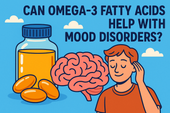
Can Omega-3 Fatty Acids Help with Mood Disorders?
Omega-3 fatty acids do more than support heart health — they can help balance mood, reduce depression, and calm anxiety. Discover how EPA and DHA nourish your brain, fight inflammation, and support emotional well-being from within. 🌊🧠
-

Vitamin D and Mood: The Sunshine Vitamin for Emotional Balance
Could the key to emotional balance be as simple as a little sunlight? Discover how vitamin D — the sunshine vitamin — influences serotonin, reduces inflammation, and helps you feel more positive and resilient year-round. ☀️💛
-

The Role of Magnesium in Reducing Irritability and Low Mood
Feeling on edge or emotionally drained? Magnesium could be the missing link between your body and your mood. Discover how this essential mineral reduces irritability, balances neurotransmitters, and helps your nervous system find calm again. 🌿✨
-
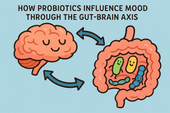
How Probiotics Influence Mood Through the Gut-Brain Axis
Discover how probiotics can do more than support your digestion—they can actually uplift your mood. This article explores the fascinating gut-brain axis and how balancing your gut bacteria through probiotics may help reduce anxiety, improve emotional stability, and support long-term mental well-being. 🌿🧠
-
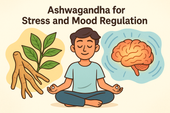
Ashwagandha for Stress and Mood Regulation
Discover how Ashwagandha, the powerful adaptogenic herb 🌿, helps your body manage stress and regulate mood. Learn how it balances cortisol, boosts GABA and serotonin, and supports emotional stability — helping you feel calm, focused, and resilient every day.
-
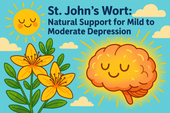
St. John’s Wort: Natural Support for Mild to Moderate Depression
Discover how St. John’s Wort, the “sunshine herb” 🌼, naturally supports mild to moderate depression. Learn how it boosts serotonin, balances mood, and promotes emotional resilience — with research showing its effectiveness compares to antidepressants, but with fewer side effects.
-
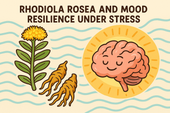
Rhodiola Rosea and Mood Resilience Under Stress
Discover how Rhodiola rosea helps your body adapt to stress 🌿. Learn how this powerful adaptogen balances cortisol, supports serotonin and dopamine, and strengthens emotional resilience — helping you stay calm, focused, and energized under pressure.
-

Chamomile and Lavender: Herbal Calm for Emotional Fluctuations
Discover how chamomile and lavender bring calm to emotional ups and downs 🌿. Learn how these two soothing herbs balance your nervous system, ease anxiety, and support restful sleep — naturally helping you find peace and emotional stability.
-
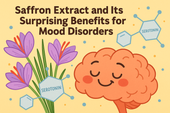
Saffron Extract and Its Surprising Benefits for Mood Disorders
Discover how saffron extract — the golden spice of joy 🌸 — can naturally support mood balance, ease anxiety, and lift mild depression. Learn what science says about its serotonin-boosting power, the ideal dosage, and how this ancient remedy compares to modern antidepressants.
-
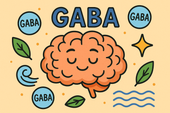
GABA Supplements for Reducing Anxiety and Mood Swings
Discover how GABA supplements can help reduce anxiety and balance mood naturally 🌿. Learn how this calming neurotransmitter works to quiet the mind, ease stress, and improve sleep — plus which nutrients and habits can boost your body’s own GABA production for long-term emotional stability.
-
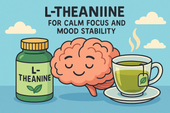
L-Theanine for Calm Focus and Mood Stability
Discover how L-theanine, the calming compound found in green tea 🍵, promotes focus, relaxation, and mood stability. Learn the science behind how it balances neurotransmitters, reduces stress hormones, and enhances clarity — helping you stay centered, calm, and productive without sedation.
-
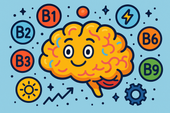
B Vitamins and Brain Chemistry: Supporting Energy and Emotional Balance
Discover how B vitamins power your brain chemistry ⚡. Learn how B6, B9, and B12 support serotonin, dopamine, and energy production — helping boost focus, mood, and emotional balance. From diet to supplements, explore how this vital nutrient group keeps your mind resilient and your energy steady.
-

N-Acetyl Cysteine (NAC) and Mood Disorders: What the Research Says
Learn how N-Acetyl Cysteine (NAC) supports brain health and mood balance 🧠. Discover how this antioxidant helps reduce oxidative stress, regulate glutamate, and improve emotional stability in depression, bipolar disorder, and anxiety — backed by cutting-edge psychiatric research.
-

Supplements for Bipolar Disorder: What May Support Stability
Discover the best supplements for bipolar disorder 🌿 that may support emotional stability and brain health. Learn how nutrients like omega-3s, magnesium, vitamin D, and NAC can help reduce inflammation, balance neurotransmitters, and complement traditional treatment safely.

















































